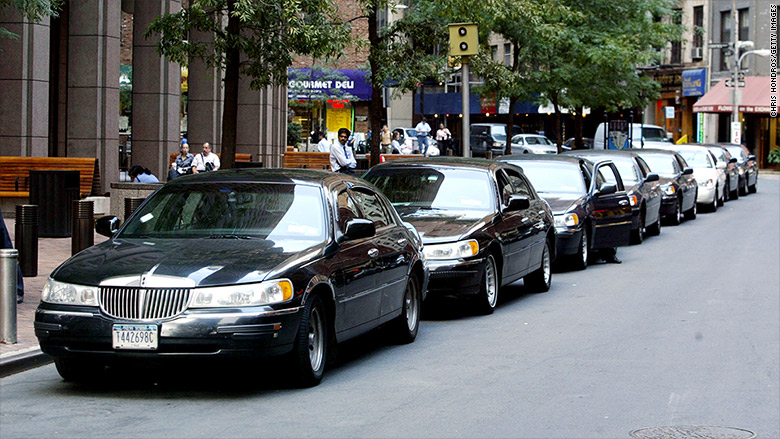
Walk around Wall Street at 10 p.m . at night and it kind of looks like the presidential motorcade is in town.
Black cars line up outside the front doors of the big banks -- Goldman Sachs (GS), Citigroup (C), JP Morgan (JPM), etc. Sometimes they even stretch around the block.
There's a "10 p.m. club" on Wall Street because that's the hour when most bankers can book a car to drive them home for free.
Of course, it's not entirely free. It comes out of the bank's expense account -- or a client's. But it's free to the employee.
It's notable that only a few years ago, the standard on Wall Street was for free cars starting at 8 p.m.
Of the big four banks -- Goldman, Citi, JPM and Bank of America (BAC) -- three have moved the car home time to 10 p.m., according to sources. Only JP Morgan still allows free cars starting at 9 p.m.
Wall Street bankers are expected to put in long hours, but their hours appear to be getting even longer, at least if you judge by when they can get a ride home.
Related: Goldman Sachs bans interns from staying overnight at the office
Saving money: Banks are trying to cut costs. They are under pressure to make more money for their shareholders, but that's harder to do with the new regulations in place since the financial crisis. Financial institutions have had to beef up legal and compliance departments, and those don't bring in cash and clients.
The quiet shift back in the "go home" hour might backfire with a segment of the workforce that is serious about work-life balance. Millennials are demanding a different kind of work culture, and some top graduates are voting with their feet -- by heading to tech firms and startups where the financial payoff can still be quite large, but the culture is less demanding.
"In general, it's hard to fight the tech companies because their culture is great," says Adam Goldstein, co-founder of hiring marketplace Vettery, which works with many tech and financial clients. "Banks are just not known as fun types of places."
Work-life balance: Goldman made headlines this month for instituting a policy to tell investment banking interns to go home at midnight. Many have also publicized new "Protected Saturday" policies where junior employees are supposed to be given at least Saturdays off. Others, like Bank of America, have made it a point to hire more junior bankers in an effort to make the workload easier.
Related: More bankers ok with breaking the law to get ahead
Life is particularly grating on the investment banking floor, which is all about doing big deals. Mergers and initial public offerings (IPOs) move quickly, requiring lots of overnight and weekend shifts to run the numbers and get the deal terms ready to go.
Junior bankers -- interns, entry-level analysts and associates -- put in the longest hours. They often stay past 10 p.m. and joke about eating all three meals a day in the office. Dinner is usually free for those that stay late, although that "free dinner hour" has also shifted later at some banks.
Some industry insiders told CNNMoney that the mid-level bankers feel the effects of moving back the free car home time from 8 p.m. to 10 p.m. the most. They were the ones more likely to leave between those hours, and they are more likely to have families waiting at home.
The question is whether Millennials will stay on Wall Street or leave, forcing banks to make more changes if they want to keep top talent.
"Millennials are super open and transparent about, 'hey I only plan on being here for two years,'" says Goldstein, although he notes that so far his firm has not seen much of a change in the number of first and second-year bankers leaving compared to the historical norm.


